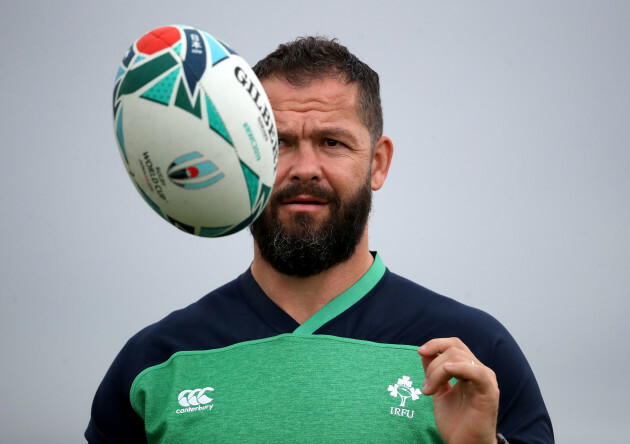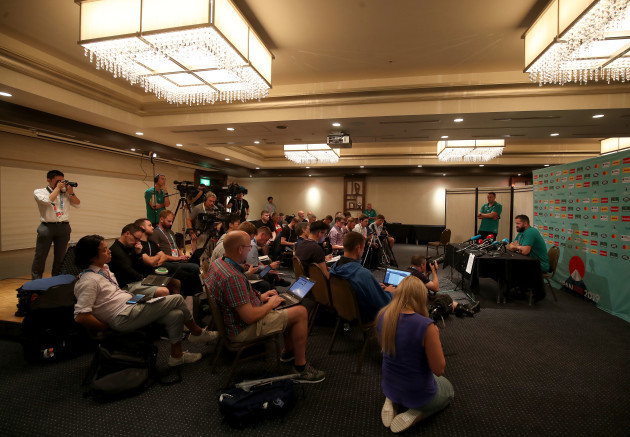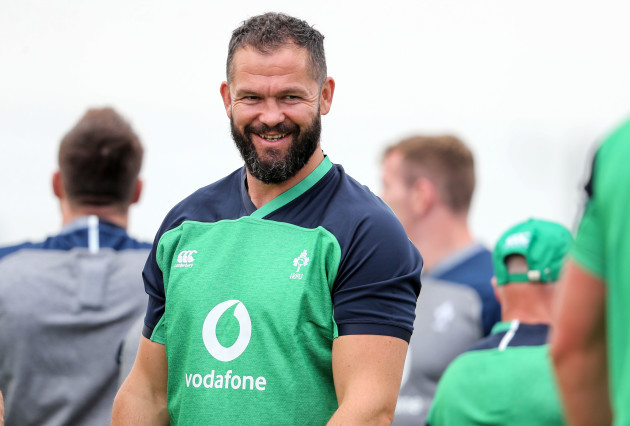THE OLD SAYING tells us that ‘attack wins games, defence wins titles.’
At the last World Cup, the All Blacks had the best attack – i.e. the highest average points and tries scored per game.
But they also had the strongest defence, statistically speaking – i.e. the lowest average points conceded per game at 13.9.
More recent examples from other competitions underline the importance of being defensively solid.
This year’s Six Nations? Grand Slam winners Wales had a considerably better defensive record than the rest.
Super Rugby? The three-peating Crusaders had the most prolific attack, sure, but they also had by some distance the best defence.
The Premiership? Champions Saracens conceded fewer tries on average than anyone else, only trailing Exeter by 0.3 in the average points conceded category.
In Europe, winners Saracens were only very narrowly edged out by Munster as the most frugal defence, while the same was true for victors Leinster in the Guinness Pro14.
All three times Ireland have won the Six Nations during Joe Schmidt’s tenure, they have conceded the fewest points of any team.
It’s very clear that you’ve got to have a good attack to win titles, but strong defence is an important starting point.
In that light, defence coach Andy Farrell - who will succeed Schmidt as Ireland boss after this World Cup – is a crucial figure in their hopes of making history in Japan.
The opening task on Sunday is a difficult one, with Gregor Townsend’s Scotland possessing a whole lot of attacking quality in the likes of out-half Finn Russell, fullback Stuart Hogg, pinball-like openside flanker Hamish Watson, and several others.
Ireland limited the Scots to just 13 points in their most recent Six Nations meeting, but Farrell is wary of the “box of tricks” Townsend’s side can bring.
“Their attacking kicking game is really potent,” explains Farrell.
“They see the space, whether it’s in behind or out wide, they’re not shy of throwing a long ball into that space and somebody picking it up on the run. They like to play at a high tempo.
“And there will be something that we’ve not seen over the last couple of years – we’re sure of that – but if we get ahead of the game and our headspace is right throughout and we are next-moment focused, then I’m sure it will be a good contest, our defence against their attack.”
Ireland’s most recent defensive performance was an encouraging one from Farrell’s point of view, as his players largely shut Wales down in their final warm-up game, limiting them to just 10 points.
Farrell’s defensive system is based around oppressive linespeed that often leaves outside backs tasked with making tough decisions on the edges – keep coming forward or sit off and wait for other defenders from the inside to work out?
Often, Ireland’s edge defenders go and try to stop the ball, even with extra attacking bodies outside. When it works, it’s superbly effective but on the occasions Ireland are skirted, fingers can be unfairly be pointed at the edge defenders, when it might have been poor interior defence that left them exposed.
“Win the collisions, first and foremost,” says Farrell when asked how defenders close to the ruck can make the wide men’s lives easier. “If you win the collisions, you can slow the ball down a little bit – it helps that fold. And the speed with which we work at too.
“It’s not all going to be perfect and you might say, ‘Ah, the Irish defence is short of numbers,’ but it’s still got to be able to deal with that accordingly.
“It’s not all a perfect picture and we’ve got to be able to adapt to what’s in front of us, not just what’s in front of us from the Scottish point of view but what we’ve actually got as well and I feel like we’re heading in the right direction with that.
“I thought against Wales last time, that when we were down a few numbers [out wide] and Wales played deep – sometimes you can’t get square and get them 20 metres behind the gainline. Sometimes you have to be able to get to the space. I thought we did that.
“The other thing we did well was that we didn’t shoot ourselves in the foot. So our decision-making was pretty pleasing in our last outing. It’s going to get tested again this weekend though.”
Under Farrell, Ireland have sometimes left fullback Rob Kearney flying solo in the backfield, covering huge space as his wings then work in and out of the frontline defence depending on how the opposition attack.
But it has been intriguing to see them play with a ’13+2′ system during the warm-up games, whereby two players are constantly situated in the backfield.
It has also been interesting to see Ireland getting more and more selective with their breakdown focus in defence. Long gone are the days where the Irish forwards threw themselves into every breakdown looking for a big turnover.
Under Farrell, Ireland have been very picky in only attacking clear opportunities to pilfer, instead keeping players on their feet in the defensive line more often and attempting to slow the opposition possession with wrestling double tackles.
Set-piece attack will be as crucial as ever at this World Cup, meaning Farrell’s men will have to be defensively on point from lineout and scrum too. In that regard, the recent hammering at the hands of England – where Ireland’s scrum defence was particularly poor – was something of a concern.
Three of England’s tries that day were scored directly on first phase of scrum attacks as Ireland’s defence endured a horror show.
“Sometimes you can be very prescriptive with set-piece and that’s where analysis sometimes gets in the way because you can actually say that things could be perceived as being black and white, and they’re not always, you know?” says Farrell when asked what went wrong that day.
“There’s got to be a little bit of feel, and hopefully what happened that week has sharpened the focus. From my point of view, it has certainly done that as far the players’ attitude on and off the field since then.
“So hopefully that will stand us in good stead throughout this competition.”
One final note on defence is the expected focus on severely clamping down on high tackles and shoulder charges at this World Cup, with World Rugby keen to show there is no tolerance for these illegal challenges.
Farrell, who shares similar concerns to Schmidt regarding the possible dangers of a very low tackle focus, says Ireland’s players are well prepared.
“It’s been a target for a good few months, hasn’t it? We work on our tackle technique and not for one second do we work on high tackle technique.
“So if one of our lads gets their technique wrong they know the consequences of that, but our lads wouldn’t be going in to seek that kind of contact anyway.”
- Originally published at 06.15
Former Ireland performance analyst and current coaching wizard of OZ Eoin Toolan joins Murray Kinsella and Gavan Casey to predict Ireland’s World Cup, break down every pool, and call the overall winners.
The42 Rugby Weekly / SoundCloud



